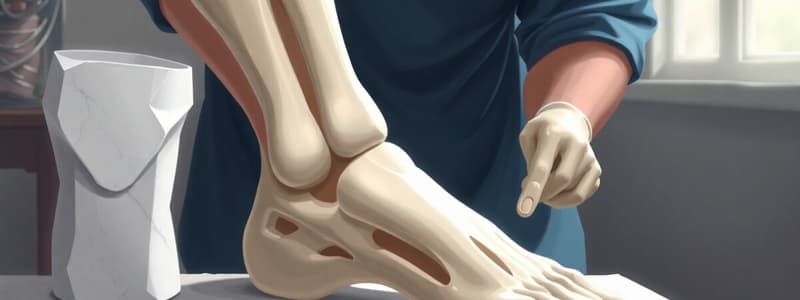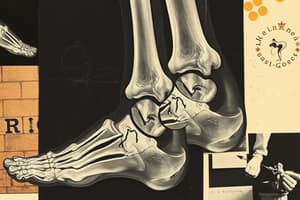Podcast
Questions and Answers
What is the first step in preparing the plaster?
What is the first step in preparing the plaster?
- Measure the length of the plaster
- Make a small tear on one side of the plaster (correct)
- Ensure the plaster is 10 to 12 sheets thick
- Roll out the cast padding
What thickness should the plaster slab be when rolled out?
What thickness should the plaster slab be when rolled out?
- 10 to 12 sheets thick (correct)
- 5 to 7 sheets thick
- 7 to 9 sheets thick
- 12 to 15 sheets thick
What should be done after marking the length on the plaster?
What should be done after marking the length on the plaster?
- Cut the plaster into strips
- Wait for the plaster to harden
- Roll out the plaster (correct)
- Begin applying the cast padding
Which of the following is NOT mentioned as a step in the detailed technique?
Which of the following is NOT mentioned as a step in the detailed technique?
What is the primary purpose of rolling out the plaster?
What is the primary purpose of rolling out the plaster?
Where should the cast or splint be applied for an ankle fracture involving the distal fibula and tibia?
Where should the cast or splint be applied for an ankle fracture involving the distal fibula and tibia?
What is the purpose of limiting ankle motion when applying a cast or splint?
What is the purpose of limiting ankle motion when applying a cast or splint?
What specific bones are involved in an ankle fracture that necessitates casting just distal to the knee?
What specific bones are involved in an ankle fracture that necessitates casting just distal to the knee?
Which part of the body should the cast or splint end when treating an ankle injury?
Which part of the body should the cast or splint end when treating an ankle injury?
In what location should a cast or splint be positioned regarding the joint for optimal immobilization of an ankle fracture?
In what location should a cast or splint be positioned regarding the joint for optimal immobilization of an ankle fracture?
Where should the cast or splint for an ankle fracture involving the distal fibula and tibia begin?
Where should the cast or splint for an ankle fracture involving the distal fibula and tibia begin?
What is the primary reason for ending the cast or splint just proximal to the toes?
What is the primary reason for ending the cast or splint just proximal to the toes?
Which bones are involved in an ankle fracture that leads to the application of a cast or splint just distal to the knee?
Which bones are involved in an ankle fracture that leads to the application of a cast or splint just distal to the knee?
When applying a cast for an ankle fracture, which of the following is true about its length?
When applying a cast for an ankle fracture, which of the following is true about its length?
In which case would a cast or splint be designed to begin just distal to the knee?
In which case would a cast or splint be designed to begin just distal to the knee?
What is the minimum degree of flexion required for the metacarpophalangeal (MCP) joints?
What is the minimum degree of flexion required for the metacarpophalangeal (MCP) joints?
What should be avoided when applying cast padding in the antecubital fossa?
What should be avoided when applying cast padding in the antecubital fossa?
Which of the following is a necessary condition for the patient's hand during a casting procedure?
Which of the following is a necessary condition for the patient's hand during a casting procedure?
Which anatomical location is crucial to monitor when applying cast padding?
Which anatomical location is crucial to monitor when applying cast padding?
Why is it important for the patient to achieve 70 degrees of MCP flexion?
Why is it important for the patient to achieve 70 degrees of MCP flexion?
What should be done if the splint material is too long?
What should be done if the splint material is too long?
What is the last step in applying a prepadded splint?
What is the last step in applying a prepadded splint?
What must be ensured when applying the prepadded splint?
What must be ensured when applying the prepadded splint?
Why would you use an elastic or self-adherent bandage during splint application?
Why would you use an elastic or self-adherent bandage during splint application?
Which of the following statements is true about the splint material?
Which of the following statements is true about the splint material?
What is the correct direction to start when applying plaster?
What is the correct direction to start when applying plaster?
How should the plaster roll be manipulated through the thumb interspace?
How should the plaster roll be manipulated through the thumb interspace?
What is the specific action required with the plaster roll in the thumb interspace?
What is the specific action required with the plaster roll in the thumb interspace?
What should be avoided during the plaster application process?
What should be avoided during the plaster application process?
During plaster application, what does 'working distally' imply?
During plaster application, what does 'working distally' imply?
What is the width of the elastic or self-adherent bandage used in the procedure?
What is the width of the elastic or self-adherent bandage used in the procedure?
What type of water is recommended for use in the procedure?
What type of water is recommended for use in the procedure?
What additional supply is mentioned that may be used optionally with the procedure?
What additional supply is mentioned that may be used optionally with the procedure?
Which of the following is mentioned as a necessary positioning technique for the patient?
Which of the following is mentioned as a necessary positioning technique for the patient?
What is the function of the 2-inch tape mentioned in the supplies?
What is the function of the 2-inch tape mentioned in the supplies?
What shape should the cuff form at the ulnar aspect of the hand?
What shape should the cuff form at the ulnar aspect of the hand?
Where should the 'V' shape be formed in relation to the thumb?
Where should the 'V' shape be formed in relation to the thumb?
What is the purpose of forming a 'V' at the ulnar aspect of the hand?
What is the purpose of forming a 'V' at the ulnar aspect of the hand?
In terms of hand structure, what does the metacarpal heads refer to?
In terms of hand structure, what does the metacarpal heads refer to?
What anatomical feature does the 'V' formation facilitate?
What anatomical feature does the 'V' formation facilitate?
What is the first step to prepare for applying a cast after positioning the stockinette?
What is the first step to prepare for applying a cast after positioning the stockinette?
Which step is performed immediately before applying the plaster roll?
Which step is performed immediately before applying the plaster roll?
During the casting process, what is done after creating three cast padding cuffs?
During the casting process, what is done after creating three cast padding cuffs?
What is the primary purpose of applying cast padding before plaster?
What is the primary purpose of applying cast padding before plaster?
What is the correct sequence of steps when preparing for a cast application?
What is the correct sequence of steps when preparing for a cast application?
Flashcards are hidden until you start studying
Study Notes
Ankle Fracture Casting Technique
- Cast/splint should end just proximal to the toes to restrict ankle movement.
- Cast/splint should begin just distal to the knee joint for ankle fractures involving the fibula and tibia.
- Mark the plaster length by making a small tear on one side.
Plaster Slab Preparation
- Use a plaster slab that is 10 to 12 sheets thick.
- Use the measured length for the plaster slab.
Cast Padding
- Wrap cast padding over the plaster to prevent it from sticking to the elastic or self-adherent bandage.
Securing the Splint
- Secure the splint definitively with an elastic or self-adherent bandage.
- Provisionally secure the plaster at the wrist with cast padding.
- Cover the plaster with strips of cast padding to protect the elastic bandage.
Layers of Padding
- Cast padding: 3 inches
- Plaster: 3 inches
- Elastic or self-adherent bandage: 3 inches
Ankle Fracture
- Cast/splint should end just proximal to the toes to limit ankle motion
- Cast/splint should begin just distal to the knee joint
- Bone above the ankle fracture is the fibula and tibia
Short Leg Cast
- Metatarsal heads should form a "V" at the lateral aspect of the foot to allow for the cascade of the digits
- Make sure the patellar tendon is not restricted to allow for unimpeded knee motion
General Cast Application
- Secure the splint with an ACE wrap starting at either end and advancing to the other end
- Secure the end of the ACE wrap with silk tape or Velcro
- Do not allow edges of cast padding to lay immediately within the antecubital fossa borders
- Patient must be able to flex their metacarpophalangeal (MCP) joints to at least 70 degrees
Short Leg Cast Application Equipment
- 4-inch stockinette
- 4- or 6-inch cast padding
- 4- to 6-inch plaster or fiberglass
Prepadded Splint
- Use a 4 inch wide elastic or self-adherent bandage
- Use a bucket of tepid water
- Use 2 inch tape (optional)
- If splint material is too long, fold or cut it to size
- Overwrap with elastic or self-adherent bandage
Posterior Elbow Splint
- Technique
- Patient Positioning
- Position the stockinette
- Wrap the extremity in cast padding
- Create three cast padding cuffs
- Fold the stockinette over both proximally and distally
- Prepare the plaster roll in the usual fashion
- Apply the plaster roll
- Palmar Flexion Crease/Metacarpal Heads: Form a “V” at the ulnar aspect of the hand to allow for the cascade of the digits.
- Thumb: Form a “V” at the base of the thumb.
- Application
- Start at the wrist and work distally
- Use a twisting motion to get through the thumb interspace
- Twist the plaster roll 360 degrees in the interspace
- Patient Positioning
Studying That Suits You
Use AI to generate personalized quizzes and flashcards to suit your learning preferences.




